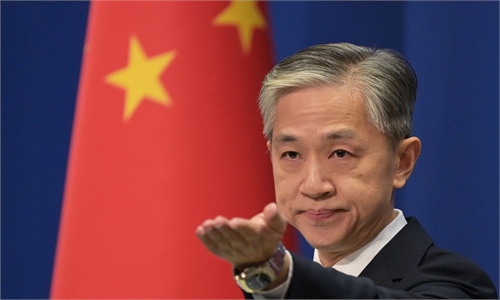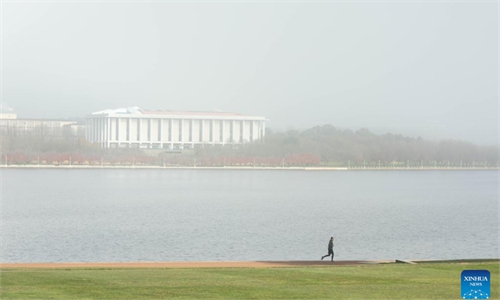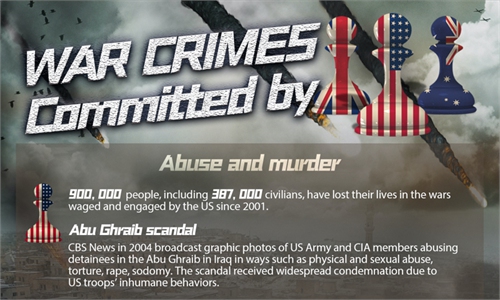Nonsense to say 'Australia needs nuclear submarines to defend itself': Australian scholar

Illustration:Chen Xia/GT
Editor's Note:After the Albanese government took office in Australia, there have been discussions about a possible reset of China-Australia ties. Global Times (GT) reporter Yan Yuzhu talked to Professor David Goodman (Goodman), director of the China Studies Centre at the University of Sydney, about his opinions on the reason why there has been hostility in Australia toward China and possible changes in the new government regarding the China policies.
GT: A few days after the Albanese government took office in Australia, you, along with several other high-profile China Studies academics, issued an open letter to Prime Minister Anthony Albanese and Foreign Minister Penny Wong, urging less public aggression and adjustment in approach to China. What kind of response did this open letter receive?
Goodman: There has been a bit of easing of tensions, we had a very nasty government before, and the new government coming in has had to be very careful about what it is about to do and what it would say.
I think this government is definitely more inclined to deal with sensible diplomacy with China than standing up in public and telling China why it is wrong. That's a good thing, because talk is always preferable to war.
Penny Wong is a great foreign minister, as she is listening to people and doing things. She has put a whole new working party in place to see how we can more positively deal with our foreign policy. Although I don't think they did it because we wrote our open letter, but certainly it was the spirit of the times.
There were a few people in public, not many, who criticized the open letter. There was one guy who wrote an opinion piece for The Australian, which is one of the big newspapers, and said we were traitors for two reasons, one was for writing this letter, and the other was because it was published by Xinhua News Agency exactly at the same time as it was first published in Australia. He blamed us for that, though of course we hadn't contacted Xinhua at all.
Generally, though, I think the open letter has gone fine. Even a number of people who were part of the Morrison government have not said that particular letter was wrong, even if it was a criticism of the way he was acting toward China.

David Goodman Photo: Courtesy of Goodman
GT: How do you see the prospect of a renewed China-Australia relationship? How different will the Albanese government's policy toward China be compared to that of the Morrison government?Goodman: We just had a change in government, which has to move slowly in what it's doing. I saw no negative signs from the Australian side or the Chinese side for that matter after the meeting between the two foreign ministers, and I don't think you can do any more than that.
Of course, if you interpret what the foreign minister of China said as meaning that Australia shouldn't have an alliance with the United States, you might see that as an unreasonable demand if you were in Australia. There is a big debate in the moment about whether or not we would be better having an alliance with the US. You can imagine which side of that discussion I fall on, it's quite obvious. But it's a discussion you have to have, which we've had a little, but not a lot before.
A lot of nonsense is talked such as "Australia needs to have nuclear submarines to defend itself." It doesn't work, and there are many opinion influencers who agree with me that this is really not healthy.
Of course, we don't want to be attacked by anyone, but when you think about what it would take China to physically attack Australia, including logistic and military challenges, it will be clear that China will not do so.
But a lot of the defense officials in the past government in Australia are thinking about what we would do as Australians if China "invaded" Taiwan. How crazy. Even people who are anti-China in the UK and the US have said that kind of argument is rubbish, because it is.
What I'd like to see in the bilateral relationship is that the trade ties could ease. The previous government made some statements and criticism about Chinese trade practices which led to bad trade relations between the two countries. I'd like to see them eased. And in my opinion, China has some severe economic problems ahead. It would be in China's interests to solve them.
One way to solve, for example, is that coal imports would be put back on proper track. At the moment, we all know coal from Australia still goes to China, but it doesn't go in the simplest, cheapest way - instead, it goes through a third party, which is ridiculous and just costing more money. It's a waste of time, resources and efforts. Let's not do that.
The new government will be very different in one very important respect - its policy will be based on diplomacy and not on shouting. That's not a small thing - standing up in public and telling China what to do. Scott Morrison, the former prime minister, was at it again. He went to a conference on July 14 in South Korea, doing the same kind of thing - trying to say how good he was because he had faced up to China, which clearly doesn't work.
GT: While most countries try to maintain a balance between China and the US, Australia chose to completely stand with the US, the result of which is not in Canberra's interests. How do you think of it?
Goodman: About Australia's hostility toward China, one of the reasons is that politicians outside China prefer a threat to exist so that they can use it to mobilize support for themselves. As a result, both China and Russia become the new fashionable threats.
Besides, it is because of the US and European defense industries who fund one of Australia's leading think tank that leads the charge against China.
Arms makers of course want there to be a China threat because they can sell more. It's a logic of capitalism I'm afraid.
As to Australia's stance toward the US, there is a debate going on in Australia as I mentioned before. I don't know who the majority supports, but there is a sizable body of opinion that doesn't think that America is the answer to all our problems. There's also a lot of discussion in Australia about foreign interference and involvement in the local property market.
All countries try to create spheres of influence in other countries, which is also called lobbying or intelligence networks. So why not do something which is not underhand but quite open?
A publicity campaign, that's what the US has had for some time through Hollywood, music, sports, and all kinds of ways in which it has a better reputation. Its politics stink in Australia, but still, they have a good reputation. And China could encourage things like that if it wants to influence the government and public opinion.
GT: Against the backdrop of the negative China narrative created by the Morrison government for many years, how do you think the Australian community should enhance its understanding of China, and improve two-way communication? What are the opportunities?
Goodman: If more people know about China through education, experience and interaction, won't it be better for everybody?
For a long time, I've thought it would be good to encourage people in the same profession from China and Australia to have forums where they can meet and discuss, because I think when you bring people together who do similar things, even if they're from two different cultures, they can cooperate and begin to understand each other's country, and then they make friends.
Not only should we do it through professional organizations, we should also do it with children. Schoolchildren from Australia should go to China and vice versa, not for long periods, but for a short period at school.
What would an Australian kid do to go to school for three months in China? They have to learn Chinese beforehand, which is great. That is what I think more important to structure, which allows people-to-people relationship in real world. Let's have a long-term program and think about how we build for a future world, where people can and are encouraged to work together.



